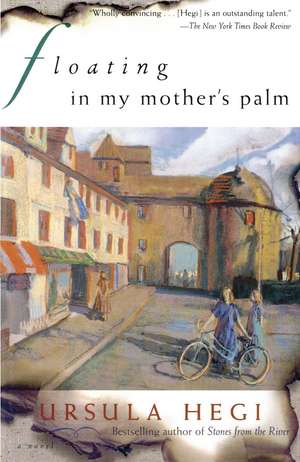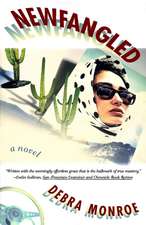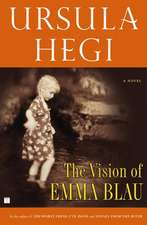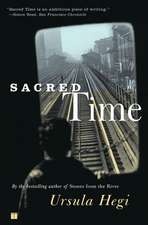Floating in My Mother's Palm
Autor Ursula Hegien Limba Engleză Paperback – 3 iul 1998
Preț: 82.11 lei
Nou
Puncte Express: 123
Preț estimativ în valută:
15.72€ • 17.08$ • 13.21£
15.72€ • 17.08$ • 13.21£
Carte disponibilă
Livrare economică 31 martie-14 aprilie
Preluare comenzi: 021 569.72.76
Specificații
ISBN-13: 9780684854755
ISBN-10: 0684854759
Pagini: 192
Dimensiuni: 140 x 216 x 13 mm
Greutate: 0.25 kg
Ediția:98000
Editura: Touchstone Publishing
Colecția Touchstone
ISBN-10: 0684854759
Pagini: 192
Dimensiuni: 140 x 216 x 13 mm
Greutate: 0.25 kg
Ediția:98000
Editura: Touchstone Publishing
Colecția Touchstone
Notă biografică
Ursula Hegi is the author of The Worst Thing I've Done, Sacred Time, Hotel of the Saints, The Vision of Emma Blau, Tearing the Silence, Salt Dancers, Stones from the River, Floating in My Mother's Palm, Unearned Pleasures and Other Stories, Intrusions, and Trudi & Pia. She teaches writing at Stonybrook's Southhampton Campus and she is the recipient of more than thirty grants and awards.
Extras
White Lilacs
When my mother entered her tenth month of carrying me, I stopped moving inside her womb. She awoke that morning to a sense of absolute silence that startled her out of dreams filled with flute music and colorful birds, dreams she'd never had until she became pregnant with me, dreams she would have again when, two years later, she carried my brother.
When I imagine my mother that morning, I see her lying alone in the double bed with the birch headboard. I have tried to imagine my father in the room with her, but I can't see him -- only my mother who raises her nightgown and spreads both hands across her taut belly, waiting for me to move. On the window is a smudge where, just yesterday, she rested her forehead against the glass while gazing at the white lilac bush that grows behind the house. Nearly fourteen years later I will tear lilacs from that bush, wrap the stems in tissue paper, and carry them to the cemetery where I will drop them into my mother's open grave.
But this morning my mother's hands move across her abdomen as she tries to reassure herself of my life. All she feels is a cloak of fear that drapes itself around her. My mother waits. But her flesh does not stir against her palms. Sister Agathe will know, she thinks. She'll know what to do. The sister has taken care of my mother since the beginning of her pregnancy, answering her many questions with kindness.
When my mother leaves the house to walk to the hospital, Frau Talmeister, who used to be one year ahead of her in school, leans in the open living room window of the house across the street. Her elbows rest on pillows she has propped on the window sill. In one hand she holds a cup of coffee. Most of her days she spends like this, disappearing only for quick trips to the bathroom or to refill her cup.
Warm gusts of wind mold my mother's dress against her spine. She is a tall woman and carries me high. When I'm three she will tell me I slept under her heart, and I'll envision a warm and well-lit place where I waited to be born.
Her dress billows in front of her belly as she walks the five blocks to the Theresienheim, which contains the convent in one wing and the home for the aged in the other. A few of the rooms are kept available for childbirth and minor emergencies. Occasionally the nuns consult a doctor, but they prefer to deal with matters on their own. For surgery the people in Burgdorf travel the ten kilometers to one of the large hospitals in Düsseldorf.
Sister Agathe examines my mother. Warm and dry, her palms move across my mother's belly. She is a slight woman with patient eyes. Her strong hands have guided many infants from the womb. "The child needs rest too." She smiles at my mother. "It's normal."
My mother has trusted Sister Agathe ever since she was a girl and the sister removed a rusty nail from her bare foot. Twice her parents took her to the Theresienheim with a broken arm, and each time Sister Agathe set her bone without scolding her for being careless. When she became pregnant, my mother chose the sister instead of going to the midwife.
"It won't be long now." The sister's hand brushes a strand of damp hair from my mother's forehead.
My mother wants to believe her. Yet, she has felt my relentless movements for months now, growing more powerful with each day. To her, the cessation of my efforts signals something terribly wrong.
"Go home now," the sister tells her. "Rest if you can."
It has taken my mother four years of marriage to become pregnant. "But what if something is wrong?"
"Nothing is wrong. I wish you wouldn't worry."
Though my mother wants to protest, she sits up and lowers her dress. Her steps echo through the tiled halls of the convent. Outside, the spring air is tinged with scents of cinnamon and vanilla. At the corner the Hansen bakery truck stands parked, its side panel open to display loaves of crisp bread, glazed buns, and pastries.
Three days of waiting press my mother into cold swells of fear that she tries to ease with prayers she can't finish because she keeps forgetting words, entire lines.
"Move," she whispers to me while my father sleeps next to her.
"Move," she screams at me when she is alone.
Her hands keep returning to her belly, which is low and massive and still. She tries to paint, but the shapes don't match her vision, and the colors feel fiat. She builds an oak frame for a painting she finished last February of deer grazing among blue winter trees. Bare patches show through the snow-covered ground where the deer search for grass. Their bellies are white reflections of the snow.
When finally she feels the tightening of her uterus -- like monthly cramps, only stronger -- she envisions the child within her stirring again. But this feels different, not the shape of a head or limb expanding her abdomen for an instant, but rather an ultimate rising of her center toward something unknown, yet familiar.
It is early, a quarter past six, when she walks back to the convent. Frau Talmeister's window is closed. The streets are vacant A few of the buildings are still piles of rubble from the war that ended last year, but most of the houses have been rebuilt. The leaves of the chestnut trees cast long shadows across the sidewalk. My mother walks along Schreberstrasse, past the brook where, as a girt, she used to swing herself across the shallow water, gripping the branches of the willow that grows high and wide above the brook. She passes the playground where empty benches surround the sandbox. Without motion the swings hang from their steel frames.
The Theresienheim is locked. Beams of sun break the chill of morning and strike the stained-glass windows of the chapel, fanning into feathers of blood and sky. My mother rings the bell outside the carved door. Her legs feel cold and heavy She hesitates before she rings again.
After what seems like a long time, a young postulant opens the door far enough to block it with her body. "The sisters are in church."
"I need to see Sister Agathe. The child --"
"Can you come back in all hour?"
"-- it's about to be born, I think."
The postulant averts her eves from my mother's belly as if ashamed for her. "The sisters need their breakfast after mass."
"Sister Agathe would want to know." Pain presses itself through my mother's womb, enshrouds her spine -- white wafers of fire.
"I'm not allowed to call them out of church." The postulant falters. "But I'll let you wait." she whispers and opens the door further to let my mother in. "Over there." She points to the bench under the painting of Jesus exposing his bleeding heart through the blue folds of his tunic.
My mother gathers her hands across her huge belly, as if holding me like this will somehow protect both of us. Carefully, she lowers herself onto the rigid bench. The high voices of the nuns glide through the closed door of the chapel, weightless above the current of the organist's "Ave Maria," a river of sound that spills across my mother and makes her wish she could drift within it. But she is seized by another contraction, and despite her bulk, she feels incredibly small, much smaller than the cry that escapes her.
When the nuns file out of the chapel, their black habits swish in soft waves around their shoes. Heads bent, hands tucked into the opposite ends of their sleeves, they walk silently past my mother, whose hands grip the plank of the bench. Her face feels numb from trying to hold the pain within herself.
"Here. Let me." Sister Agathe separates herself from the line of nuns. Gently, she grasps my mother's elbow and leads her down a long corridor, past open doors that frame the beds of the old people who live here. In an empty white room, she helps my mother climb on a long table covered with a starched sheet. "I'm sorry you had to wait for me." Running her hands across my mother's belly, she stands with her head tilted as if listening for the sound of something far away.
"Can you feel --"
"Wait." Her palms prod my mother's sides as though trying to lift the child through the wall of flesh.
Suddenly my mother finds it difficult to breathe. "Sister Agathe --"
"Wait," the sister says again. "Please?" A fine layer of sweat has formed above her upper lip. "I'll be back in a minute." Without looking at my mother, she leaves the room.
My mother guides her hands along the familar outline of her belly which is taut and still. She draws in a deep breath that makes the skin beneath her fingers expand. Carefully she releases it, then draws in another long breath and holds it.
When Sister Agathe returns, she brings Sister Ingeborg, the supervisor of nurses; she tells my mother to move her palms from her abdomen and replaces them with her own pale hands.
Into the silence my mother blurts, "You must call a doctor. Please!" It takes courage for her to request this. She has grown up in this town. Has grown up with these sisters who teach school and tend to the ill. With these sisters who've become accustomed to the obedience they've nurtured in women and children.
The sisters glance at each other as Sister Agathe steps back from the table. She pulls a handkerchief from her sleeve, dabs at her upper lip.
"The child --" Sister Ingeborg shakes her head. "It's too late. You've carried the child too long."
My mother feels her womb tighten in protest under the nun's touch. She raises herself on her elbows, searches Sister Agathe's face for some signal, some promise, but the sister's eyes flicker away, and her fingers stray to the rosary hanging from her belt.
"The child's soul is with the Lord now." Sister Ingeborg's voice is calm. Assuring. "Your body will expel it whenever it is ready."
During my first year of life, when she nurses me, my mother will often recall the rage that sprang up within her at the nun's words, a rage that gave her the courage to hoist herself from the white table and walk from the room, from the hospital and into the street where the Hansen bakery truck was parked. She persuaded the driver, Herr Meier, to close the side panel and drive her to the midwife's house. Inside the white truck with the blue lettering, surrounded by the fresh dough smell of the morning loaves, she felt her contractions become a pulse independent of her own, swallowing her own, a red pulse of rage that sustained the only faith she was capable of -- that the child within her was alive.
Copyright © 1990 by Ursula Hegi
When my mother entered her tenth month of carrying me, I stopped moving inside her womb. She awoke that morning to a sense of absolute silence that startled her out of dreams filled with flute music and colorful birds, dreams she'd never had until she became pregnant with me, dreams she would have again when, two years later, she carried my brother.
When I imagine my mother that morning, I see her lying alone in the double bed with the birch headboard. I have tried to imagine my father in the room with her, but I can't see him -- only my mother who raises her nightgown and spreads both hands across her taut belly, waiting for me to move. On the window is a smudge where, just yesterday, she rested her forehead against the glass while gazing at the white lilac bush that grows behind the house. Nearly fourteen years later I will tear lilacs from that bush, wrap the stems in tissue paper, and carry them to the cemetery where I will drop them into my mother's open grave.
But this morning my mother's hands move across her abdomen as she tries to reassure herself of my life. All she feels is a cloak of fear that drapes itself around her. My mother waits. But her flesh does not stir against her palms. Sister Agathe will know, she thinks. She'll know what to do. The sister has taken care of my mother since the beginning of her pregnancy, answering her many questions with kindness.
When my mother leaves the house to walk to the hospital, Frau Talmeister, who used to be one year ahead of her in school, leans in the open living room window of the house across the street. Her elbows rest on pillows she has propped on the window sill. In one hand she holds a cup of coffee. Most of her days she spends like this, disappearing only for quick trips to the bathroom or to refill her cup.
Warm gusts of wind mold my mother's dress against her spine. She is a tall woman and carries me high. When I'm three she will tell me I slept under her heart, and I'll envision a warm and well-lit place where I waited to be born.
Her dress billows in front of her belly as she walks the five blocks to the Theresienheim, which contains the convent in one wing and the home for the aged in the other. A few of the rooms are kept available for childbirth and minor emergencies. Occasionally the nuns consult a doctor, but they prefer to deal with matters on their own. For surgery the people in Burgdorf travel the ten kilometers to one of the large hospitals in Düsseldorf.
Sister Agathe examines my mother. Warm and dry, her palms move across my mother's belly. She is a slight woman with patient eyes. Her strong hands have guided many infants from the womb. "The child needs rest too." She smiles at my mother. "It's normal."
My mother has trusted Sister Agathe ever since she was a girl and the sister removed a rusty nail from her bare foot. Twice her parents took her to the Theresienheim with a broken arm, and each time Sister Agathe set her bone without scolding her for being careless. When she became pregnant, my mother chose the sister instead of going to the midwife.
"It won't be long now." The sister's hand brushes a strand of damp hair from my mother's forehead.
My mother wants to believe her. Yet, she has felt my relentless movements for months now, growing more powerful with each day. To her, the cessation of my efforts signals something terribly wrong.
"Go home now," the sister tells her. "Rest if you can."
It has taken my mother four years of marriage to become pregnant. "But what if something is wrong?"
"Nothing is wrong. I wish you wouldn't worry."
Though my mother wants to protest, she sits up and lowers her dress. Her steps echo through the tiled halls of the convent. Outside, the spring air is tinged with scents of cinnamon and vanilla. At the corner the Hansen bakery truck stands parked, its side panel open to display loaves of crisp bread, glazed buns, and pastries.
Three days of waiting press my mother into cold swells of fear that she tries to ease with prayers she can't finish because she keeps forgetting words, entire lines.
"Move," she whispers to me while my father sleeps next to her.
"Move," she screams at me when she is alone.
Her hands keep returning to her belly, which is low and massive and still. She tries to paint, but the shapes don't match her vision, and the colors feel fiat. She builds an oak frame for a painting she finished last February of deer grazing among blue winter trees. Bare patches show through the snow-covered ground where the deer search for grass. Their bellies are white reflections of the snow.
When finally she feels the tightening of her uterus -- like monthly cramps, only stronger -- she envisions the child within her stirring again. But this feels different, not the shape of a head or limb expanding her abdomen for an instant, but rather an ultimate rising of her center toward something unknown, yet familiar.
It is early, a quarter past six, when she walks back to the convent. Frau Talmeister's window is closed. The streets are vacant A few of the buildings are still piles of rubble from the war that ended last year, but most of the houses have been rebuilt. The leaves of the chestnut trees cast long shadows across the sidewalk. My mother walks along Schreberstrasse, past the brook where, as a girt, she used to swing herself across the shallow water, gripping the branches of the willow that grows high and wide above the brook. She passes the playground where empty benches surround the sandbox. Without motion the swings hang from their steel frames.
The Theresienheim is locked. Beams of sun break the chill of morning and strike the stained-glass windows of the chapel, fanning into feathers of blood and sky. My mother rings the bell outside the carved door. Her legs feel cold and heavy She hesitates before she rings again.
After what seems like a long time, a young postulant opens the door far enough to block it with her body. "The sisters are in church."
"I need to see Sister Agathe. The child --"
"Can you come back in all hour?"
"-- it's about to be born, I think."
The postulant averts her eves from my mother's belly as if ashamed for her. "The sisters need their breakfast after mass."
"Sister Agathe would want to know." Pain presses itself through my mother's womb, enshrouds her spine -- white wafers of fire.
"I'm not allowed to call them out of church." The postulant falters. "But I'll let you wait." she whispers and opens the door further to let my mother in. "Over there." She points to the bench under the painting of Jesus exposing his bleeding heart through the blue folds of his tunic.
My mother gathers her hands across her huge belly, as if holding me like this will somehow protect both of us. Carefully, she lowers herself onto the rigid bench. The high voices of the nuns glide through the closed door of the chapel, weightless above the current of the organist's "Ave Maria," a river of sound that spills across my mother and makes her wish she could drift within it. But she is seized by another contraction, and despite her bulk, she feels incredibly small, much smaller than the cry that escapes her.
When the nuns file out of the chapel, their black habits swish in soft waves around their shoes. Heads bent, hands tucked into the opposite ends of their sleeves, they walk silently past my mother, whose hands grip the plank of the bench. Her face feels numb from trying to hold the pain within herself.
"Here. Let me." Sister Agathe separates herself from the line of nuns. Gently, she grasps my mother's elbow and leads her down a long corridor, past open doors that frame the beds of the old people who live here. In an empty white room, she helps my mother climb on a long table covered with a starched sheet. "I'm sorry you had to wait for me." Running her hands across my mother's belly, she stands with her head tilted as if listening for the sound of something far away.
"Can you feel --"
"Wait." Her palms prod my mother's sides as though trying to lift the child through the wall of flesh.
Suddenly my mother finds it difficult to breathe. "Sister Agathe --"
"Wait," the sister says again. "Please?" A fine layer of sweat has formed above her upper lip. "I'll be back in a minute." Without looking at my mother, she leaves the room.
My mother guides her hands along the familar outline of her belly which is taut and still. She draws in a deep breath that makes the skin beneath her fingers expand. Carefully she releases it, then draws in another long breath and holds it.
When Sister Agathe returns, she brings Sister Ingeborg, the supervisor of nurses; she tells my mother to move her palms from her abdomen and replaces them with her own pale hands.
Into the silence my mother blurts, "You must call a doctor. Please!" It takes courage for her to request this. She has grown up in this town. Has grown up with these sisters who teach school and tend to the ill. With these sisters who've become accustomed to the obedience they've nurtured in women and children.
The sisters glance at each other as Sister Agathe steps back from the table. She pulls a handkerchief from her sleeve, dabs at her upper lip.
"The child --" Sister Ingeborg shakes her head. "It's too late. You've carried the child too long."
My mother feels her womb tighten in protest under the nun's touch. She raises herself on her elbows, searches Sister Agathe's face for some signal, some promise, but the sister's eyes flicker away, and her fingers stray to the rosary hanging from her belt.
"The child's soul is with the Lord now." Sister Ingeborg's voice is calm. Assuring. "Your body will expel it whenever it is ready."
During my first year of life, when she nurses me, my mother will often recall the rage that sprang up within her at the nun's words, a rage that gave her the courage to hoist herself from the white table and walk from the room, from the hospital and into the street where the Hansen bakery truck was parked. She persuaded the driver, Herr Meier, to close the side panel and drive her to the midwife's house. Inside the white truck with the blue lettering, surrounded by the fresh dough smell of the morning loaves, she felt her contractions become a pulse independent of her own, swallowing her own, a red pulse of rage that sustained the only faith she was capable of -- that the child within her was alive.
Copyright © 1990 by Ursula Hegi
Recenzii
The New York Times Book Review Wholly convincing...[Hegi] is an outstanding talent.
Los Angeles Times Stunning...it can break your heart....[Hegi] has created an absolutely correct postwar Germany with all its forbidden questions and mysterious behavior, all its squalor, loss and longing.
Michael Dorris Lyrically transforms the memory of particular people and place into a song sung with great beauty and meaning. This novel is a gift to savor...stirring, unforgettable.
Chicago Tribune Brilliant...mesmerizing reading [by] a talented and insightful author.
The Seattle Times/Post-Intelligencer Beautiful...tender...vividly and memorably painted.
Alice McDermott A graceful, lyrical, heartbreaking book that offers many pleasures, not the least of which is the opportunity to read a very talented author writing at the top of her form, telling stories she seems born to tell in a voice that is completely her own. Marvelous.
Lynne Sharon Schwartz A treasure of a book. At once amazingly delicate and eerily powerful, it envelops the reader in the raw, painful, and poignant life of a small town in postwar Germany -- benumbed, bewildered, and, sadly, not much wiser. Ursula Hegi is a beautiful writer with much truth to tell.
San Francisco Review of Books Exquisite...Hegi's language signals a rare and particular power. There is a sonorous, hypnotic hum about these sentences that resound as prose, poetry, and hymn -- and when we put the book down, its after-images burn the mind's eye.
Bob Shacochis If Stravinsky were a writer, I imagine he would have written a book such as this, for Ursula Hegi gathers all the tonal moods and emotional power to her work that we expect of music that moves us to appreciate our hearts and souls and their troubling complexity.
New York Newsday An unusual, beautifully written book that sets the coming-of-age of a perceptive child, full of merriment, pain, and compassion, against the brilliantly realized small German town relatively untouched by the world outside...remarkable.
Los Angeles Times Stunning...it can break your heart....[Hegi] has created an absolutely correct postwar Germany with all its forbidden questions and mysterious behavior, all its squalor, loss and longing.
Michael Dorris Lyrically transforms the memory of particular people and place into a song sung with great beauty and meaning. This novel is a gift to savor...stirring, unforgettable.
Chicago Tribune Brilliant...mesmerizing reading [by] a talented and insightful author.
The Seattle Times/Post-Intelligencer Beautiful...tender...vividly and memorably painted.
Alice McDermott A graceful, lyrical, heartbreaking book that offers many pleasures, not the least of which is the opportunity to read a very talented author writing at the top of her form, telling stories she seems born to tell in a voice that is completely her own. Marvelous.
Lynne Sharon Schwartz A treasure of a book. At once amazingly delicate and eerily powerful, it envelops the reader in the raw, painful, and poignant life of a small town in postwar Germany -- benumbed, bewildered, and, sadly, not much wiser. Ursula Hegi is a beautiful writer with much truth to tell.
San Francisco Review of Books Exquisite...Hegi's language signals a rare and particular power. There is a sonorous, hypnotic hum about these sentences that resound as prose, poetry, and hymn -- and when we put the book down, its after-images burn the mind's eye.
Bob Shacochis If Stravinsky were a writer, I imagine he would have written a book such as this, for Ursula Hegi gathers all the tonal moods and emotional power to her work that we expect of music that moves us to appreciate our hearts and souls and their troubling complexity.
New York Newsday An unusual, beautifully written book that sets the coming-of-age of a perceptive child, full of merriment, pain, and compassion, against the brilliantly realized small German town relatively untouched by the world outside...remarkable.




















